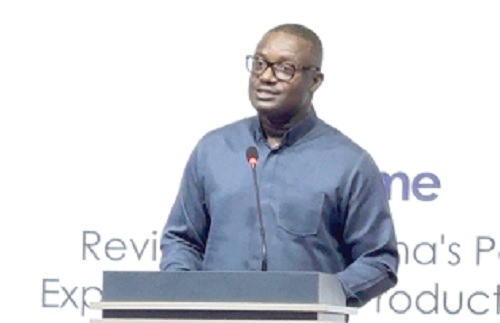
Ghana’s oil industry facing sharp decline - Energy Minister warns
The local oil industry, once heralded as a catalyst for the country’s economic transformation, is facing a series of challenges that threaten its sustainability and long-term contribution to national development, the Minister of Energy and Green Transition, John Jinapor, has said.
“An industry that has historically served as a significant source of government revenue, foreign direct investment, job creation and in-country value creation is currently experiencing rapid decline in oil production, reduced exploration activity, diminishing local content participation and growing investor uncertainty,” the minister said.
Addressing the 2025 Local Content Conference and Exhibition organised by the Petroleum Commission in Takoradi, Mr Jinapor warned that “these setbacks have far-reaching implications”.
“They undermine Ghana’s fiscal stability and weaken the nation’s capacity to harness our hydrocarbon resources potential as drivers of industrial development and socio-economic advancement,” he said.
The event was dubbed: “Revitalising Ghana’s petroleum exploration and production sector: driving innovation and defining local content for a competitive energy economy”.
The minister said the theme was a reflection of the government’s reset agenda in the sector, with the broader aim to revitalise “this critical sector of our economy”.
“The theme reflects both our current realities and aspirations, signalling our collective readiness for renewal, innovation and strategic redefinition within Ghana’s energy landscape,” he said.
Mr Jinapor revealed that between 2019, when Ghana’s crude oil production reached its peak, and 2025, output declined sharply by about 32 per cent, dropping from 71.4 million barrels to 48.2 million barrels.
The downward trend, he said, signified not only a reduction in government revenue from a sector that continued to anchor GDP, public finances and foreign exchange earnings, but also a contraction in the value of opportunities and contracts available to indigenous Ghanaian companies, the backbone of local industry participation.
Causes
The minister listed regulatory inefficiencies and protracted licensing processes, as evidenced by the outcome of the 2018 Licensing Rounds, where no petroleum agreements were concluded, as some of the reasons behind the challenges facing the industry.
He also cited ambiguous and inconsistent policies, which, he said, sent mixed signals to the investment community, “coupled with a burdensome tax regime”, as having also collectively made Ghana less competitive relative to other hydrocarbon-producing nations in the region.
“Avoidable and unnecessary legal disputes over field unitisation and frequent changes in fiscal policy changes have created an unpredictable business environment that discourages both existing and prospective investors.
Without decisive, predictable and strategic policy action, Ghana risks losing further ground in an increasingly competitive global petroleum landscape,” he added.
Prospects
The country, he said, was, however, repositioning itself as a world-class investment destination to secure the sustainable development of its petroleum resources for current and future generations.
Mr Jinapor said the government would terminate inactive petroleum agreements to ensure that the country’s resources were utilised productively for the benefit of the people.
“I have, therefore, directed the Petroleum Commission to prepare an advisory paper on the matter,” he said, adding that “this cycle of repeated extensions must become a thing of the past.
With an increasing number of reputable companies, including supermajors, no contractor or operator will be allowed to hold onto a block without fulfilling its minimum work obligations”.
The minister said the current circumstances presented opportunities for transformation by addressing structural bottlenecks, enforcing local content regulations and fostering collaboration across all stakeholders.
He called on all stakeholders to approach the journey with unity, shared purpose and determination, to ensure that every decision and action maximised benefits for the country and its people.
The acting Chief Executive Officer of the Petroleum Commission, Emeafa Hardcastle, said it was imperative to focus discussions on attracting investments into the sector and local content optimisation dispassionately in the broader energy spectrum while seeking redress for the sector-specific concerns and issues.
She said there had been an engagement, pointing to the fact that “some measures ought to be taken immediately to revive investor confidence and to turn around the fortunes of the industry and increase contract opportunities for Ghanaian companies”.
In spite of the acceleration of the global energy transition and the world moving toward cleaner fuels, she said Ghana, pursuant to its energy transition framework, must harness its petroleum resources in a sustainable manner for national development and energy security.
Western Regional economy
The Western Regional Minister, Joe Nelson, said the Western Region was the physical base of the petroleum sector, hosting installations, ports, fabrication yards and thousands of workers.
“When the national industry experiences slowdown, the effects are felt swiftly within our regional economy.
Conversely, when the same sector thrives, the impact resonates far and wide, strengthening our communities, creating more opportunities and reinforcing the foundation of our shared prosperity,” he said.
Mr Nelson added that revitalising exploration and production, therefore, was not just a national economic agenda but also a regional development imperative.
“It means more jobs for our youth, more contracts for local businesses and more opportunities for technical training, innovation and value addition,” he said.
